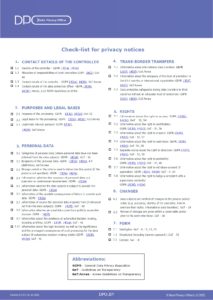(61) Informování subjektu údajů o tom, že jsou zpracovávány jeho osobní údaje, by mělo proběhnout v okamžiku jejich shromáždění od subjektu údajů, nebo pokud jsou získávány z jiného zdroje, v přiměřené lhůtě v závislosti na okolnostech případu. Jestliže mohou být osobní údaje oprávněně sděleny jinému příjemci, měl by být subjekt údajů informován o jejich prvním sdělení tomuto příjemci. Pokud správce hodlá osobní údaje zpracovat pro jiný účel, než je účel, pro který byly shromážděny, měl by poskytnout subjektu údajů informace o tomto jiném účelu a další nezbytné informace ještě před uvedeným dalším zpracováním. Pokud z důvodu využití různých zdrojů nemůže být subjektu údajů sdělen původ osobních údajů, měly by být poskytnuty obecné informace.
(61) The information in relation to the processing of personal data relating to the data subject should be given to him or her at the time of collection from the data subject, or, where the personal data are obtained from another source, within a reasonable period, depending on the circumstances of the case. Where personal data can be legitimately disclosed to another recipient, the data subject should be informed when the personal data are first disclosed to the recipient. Where the controller intends to process the personal data for a purpose other than that for which they were collected, the controller should provide the data subject prior to that further processing with information on that other purpose and other necessary information. Where the origin of the personal data cannot be provided to the data subject because various sources have been used, general information should be provided.
(62) Povinnost poskytnout informace však není třeba ukládat v případech, kdy subjekt údajů již uvedené informace má, nebo kdy zaznamenání či zpřístupnění osobních údajů je výslovně stanoveno právními předpisy, nebo kdy poskytnutí těchto informací subjektu údajů není možné nebo by vyžadovalo neúměrné úsilí. Poskytnutí informací by mohlo vyžadovat neúměrné úsilí zejména tehdy, je-li zpracování prováděno pro účely archivace ve veřejném zájmu, pro účely vědeckého či historického výzkumu nebo pro statistické účely. V tomto ohledu by se mělo přihlédnout k počtu subjektů údajů, ke stáří osobních údajů a k přijatým vhodným zárukám.
(62) However, it is not necessary to impose the obligation to provide information where the data subject already possesses the information, where the recording or disclosure of the personal data is expressly laid down by law or where the provision of information to the data subject proves to be impossible or would involve a disproportionate effort. The latter could in particular be the case where processing is carried out for archiving purposes in the public interest, scientific or historical research purposes or statistical purposes. In that regard, the number of data subjects, the age of the data and any appropriate safeguards adopted should be taken into consideration.
(63) Subjekt údajů by měl mít právo na přístup ke shromážděným osobním údajům, které se ho týkají, a měl by moci toto právo snadno a v přiměřených odstupech uplatňovat, aby byl o jejich zpracování informován a mohl si ověřit jeho zákonnost. To zahrnuje právo subjektů údajů na přístup k údajům o svém zdravotním stavu, například k údajům ve své lékařské dokumentaci, která obsahuje například informace o diagnóze, výsledky vyšetření, posudky ošetřujících lékařů a údaje o veškeré léčbě a provedených ošetřeních nebo zákrocích. Každý subjekt údajů by proto měl mít právo vědět a být informován zejména o tom, za jakým účelem se osobní údaje zpracovávají, případně období, po které budou uchovávány, kdo jsou příjemci osobních údajů, v čem spočívá logika automatizovaného zpracování osobních údajů a jaké mohou být důsledky takového zpracování přinejmenším v případech, kdy je zpracování založeno na profilování. Je-li to možné, měl by mít správce možnost poskytnout dálkový přístup k bezpečnému systému, který by subjektu údajů umožnil přímý přístup k jeho osobním údajům. Tímto právem by neměla být nepříznivě dotčena práva ani svobody ostatních, například obchodní tajemství nebo duševní vlastnictví a zejména autorské právo chránící programové vybavení. Zohlednění těchto skutečností by ovšem nemělo vést k tomu, že by subjektu údajů bylo odepřeno poskytnutí všech informací. Pokud správce zpracovává velké množství informací týkajících se subjektu údajů, měl by mít možnost před poskytnutím informací požádat subjekt údajů, aby konkrétně uvedl, kterých informací nebo činností zpracování se jeho žádost týká.
(63) A data subject should have the right of access to personal data which have been collected concerning him or her, and to exercise that right easily and at reasonable intervals, in order to be aware of, and verify, the lawfulness of the processing. This includes the right for data subjects to have access to data concerning their health, for example the data in their medical records containing information such as diagnoses, examination results, assessments by treating physicians and any treatment or interventions provided. Every data subject should therefore have the right to know and obtain communication in particular with regard to the purposes for which the personal data are processed, where possible the period for which the personal data are processed, the recipients of the personal data, the logic involved in any automatic personal data processing and, at least when based on profiling, the consequences of such processing. Where possible, the controller should be able to provide remote access to a secure system which would provide the data subject with direct access to his or her personal data. That right should not adversely affect the rights or freedoms of others, including trade secrets or intellectual property and in particular the copyright protecting the software. However, the result of those considerations should not be a refusal to provide all information to the data subject. Where the controller processes a large quantity of information concerning the data subject, the controller should be able to request that, before the information is delivered, the data subject specify the information or processing activities to which the request relates.













(EN) ISO/IEC 27701, adopted in 2019, added additional ISO/IEC 27002 guidance for PII controllers.
Here is the relevant paragraph to article 13(2)(a) GDPR:
7.4.7 Retention
Control
The organization should not retain PII for longer than is necessary for the purposes for which the PII is processed.
Implementation guidance
The organization should develop and maintain retention schedules for information it retains, taking into account the requirement to retain PII for no longer than is necessary.
(EN) […]
(EN) Sign in
to read the full text